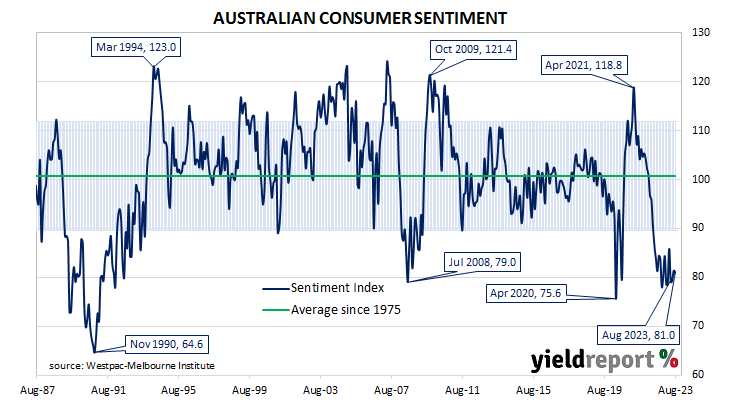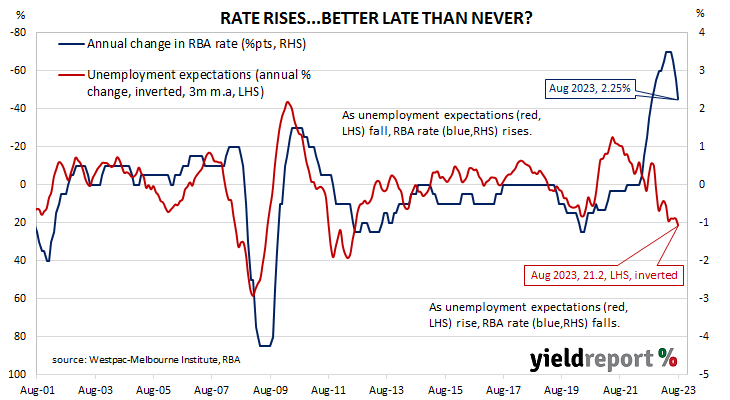Summary: Household sentiment slips a touch; muted response to RBA decision; sentiment declined further after RBA decision; Citi: result reflects optics of cash rate target above 4%; two of five sub-indices lower; fewer respondents expecting higher jobless rate.
After a lengthy divergence between measures of consumer sentiment and business confidence in Australia which began in 2014, confidence readings of the two sectors converged again in mid-July 2018. Both measures then deteriorated gradually in trend terms, with consumer confidence leading the way. Household sentiment fell off a cliff in April 2020 but, after a few months of to-ing and fro-ing, it then staged a full recovery. However, consumer sentiment has deteriorated significantly over the past two years, while business sentiment has been more robust.
According to the latest Westpac-Melbourne Institute survey conducted in the first week of August, household sentiment has slipped a touch after improving for two consecutive months. Their Consumer Sentiment Index decreased from July’s reading of 81.3 to 81.0, a reading which is well below the “normal” range and significantly lower than the long-term average reading of just over 101.
“Sentiment continues to show only a muted response to the RBA Board’s decision to leave the cash rate on hold in recent meetings,” said Westpac senior economist Matthew Hassan.
Any reading of the Consumer Sentiment Index below 100 indicates the number of consumers who are pessimistic is greater than the number of consumers who are optimistic.
The report was released on the same day as the latest NAB business survey and Commonwealth Government bond yields generally fell moderately on the day. By the close of business, the 3-year ACGB yield had lost 5bps to 3.72%, the 10-year yield had shed 6bps to 4.01% while the 20-year yield finished 1bp lower at 4.37%.
In the cash futures market, expectations regarding further rate rises softened. At the end of the day, contracts implied the cash rate would barely change from the current rate of 4.07% to average 4.08% in September and 4.11% in October. February 2024 contracts implied a 4.185% average cash rate while May 2024 contracts implied 4.15%, 8bps more than the current rate.
“Responses showed no improvement over the course of survey week, sentiment instead declining 4.9% between those surveyed prior to the RBA decision and those surveyed after,” Hassan added. He also noted mortgage-holder sentiment continued to worsen.
Citi economist Josh Williamson expanded on this point. “Our interpretation of household sentiment failing to bounce this time around reflects the optics of have the cash rate target above 4%. In other words, the level of official interest rates appears adequate to contain consumer expectations and associated metrics on finances and major purchases.”
Two of the five sub-indices registered lower readings, with the “Economic conditions – next 12 months” sub-index posting the largest monthly percentage loss.
The Unemployment Expectations index, formerly a useful guide to RBA rate changes, declined from 131.2 to 127.2. Lower readings result from more respondents expecting a lower unemployment rate in the year ahead.



